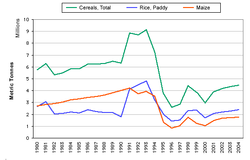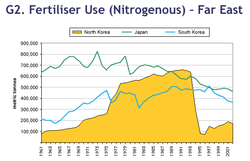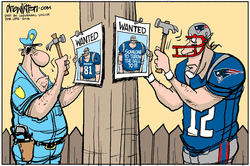 Here's two interesting images thanks to Eugenia Kalnay: The first is a plot of output (metric tons) of different crops in North Korea over time, the second fertilizer use, also in metric tons. Notice that there is a sharp drop-off of over 70%. This coincides with the 1991 end of perestroika, or the final collapse of the Soviet Union. Around this time, the rapid denationalization of fuel industries in Russia and economic turbulence resulted in an elimination of oil aid from Russia to North Korea.  Similarly, the lack of fossil fuels limited the ability to produce and implement nitrogen fertilizer in North Korea, especially compared with other Eastern countries. Say what you want about North Korea, but its incredible isolationism has made it well suited to gauging the impact of macroeconomic policy, and here serves to prove the point that availability of fossil fuels, not cropland or technology, is the leading order determiner of agricultural capability.  If you've been under a rock the last week, former New England Patriots tight end Aaron Hernandez has been indicted for first degree murder. Anyone owning an Aaron Hernandez jersey is allowed to exchange it for any other actual Patriots player's jersey for free, the reasoning being that having NFL fans wearing the jersey of a suspected murderer is not good publicity for the league or the individual team. Lemon Laws were initiated in the United States to counteract information asymmetry between the buyer of a product and the seller. Buyers are at an immediate information disadvantage to sellers, since the seller has much more of an understanding of the flaws of the product he is selling. When the product turns out to be worth less than the price the buyer paid based on prior knowledge available to the seller the buyer is defrauded, and depending on the product, has some legal ability to recoup losses. Now the non-ironic value of a Hernandez jersey is zero, and the average Patriots fan had absolutely know idea how bad of a guy he was, though it appeared to be common knowledge to insiders. His jerseys are lemons.
The Patriots are enacting an even stronger warranty (maybe a double-lemon law?), since even they didn't know Hernandez was as bad a guy as he turned out to be. So Hernandez is partially to blame for the lemoning of his own jerseys. This is sort of like a car company knowing its cars' third-party manufactured brakes wouldn't last the life of the car, only to find out that, unbeknownst to them, the brakes didn't work at all! Who should really be responsible for covering the "loss of value of Hernandez jerseys?" (assuming of course people who bought them actually care). Perhaps both the Patriots and Hernandez are equally at fault. I'm not sure how exactly to answer that question. At least here it is refreshing to see information asymmetry work in both directions. |
AuthorOceanographer, Mathemagician, and Interested Party Archives
March 2017
Categories
All
|
 RSS Feed
RSS Feed
